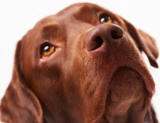
Click on
Library Icon
to learn more
|
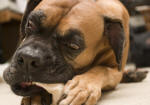 What
to do? What
to do?
Dogs need a variety of safe
things to chew. Each dog is an individual. Some dogs like to chew more than
others. However, you can encourage your dog to expend energy by chewing if
your provide desirable chews and praise approved chewing behavior.
You may want to start off with
softer edible chews (vegetable based). As the dog destroys a chewing
habit, you can
provide harder chews. PRAISE correct chewing. Do not allow access to inappropriate chews such as
socks or shoes, or very hard chews like sterilized bones until the dog is an
experienced chewer of approved items.
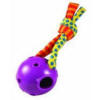
Why do it?
Chewing gives your dog something positive to do. When dogs are chewing on
something, they are generally calm and well-behaved.
|
Just
as birds fly and fish swim, dogs chew. According to veterinary
dentists, broken teeth are a common problem in dogs. |
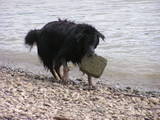 The primary cause is aggressive chewing on hard objects such as rocks,
fencing, or hard treats such as cow hooves, bones or hard nylon toys. The
broken tooth exposes the delicate pulp and nerve endings making life
extremely painful for the pet. Food and other debris of daily doggyhood can
get impacted in the fracture and attract bacteria leading to infection, the
loss of the tooth, or worse. The primary cause is aggressive chewing on hard objects such as rocks,
fencing, or hard treats such as cow hooves, bones or hard nylon toys. The
broken tooth exposes the delicate pulp and nerve endings making life
extremely painful for the pet. Food and other debris of daily doggyhood can
get impacted in the fracture and attract bacteria leading to infection, the
loss of the tooth, or worse.
Chewing
provides an important stress relieving mechanism. To prevent broken teeth,
make sure that you have several approved toys that are safe for your pet to
chew. This will satisfy
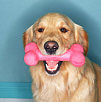 a natural instinct and keep him away from
inappropriate or dangerous objects. Kong toys and softer chews such as
rawhide are recommended. a natural instinct and keep him away from
inappropriate or dangerous objects. Kong toys and softer chews such as
rawhide are recommended.
Dental experts also recommend making sure that your
pet gets plenty of regular exercise to help prevent pent up energy that
could lead to destructive chewing. Just as the human family gets regular
dental examinations and cleanings, you should take your pet to the
veterinarian at least yearly for a comprehensive physical examination that
will include a look at you pet's entire mouth.
What to look for
One sign of
dental problems are excessive drooling in pets that don't normally salivate
very much, loss of appetite or seeming to favor one side of his mouth.
|
 |
|